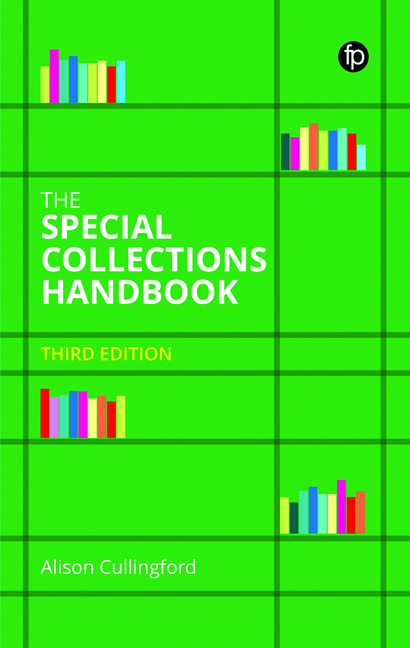Book contents
4 - Acquiring and Developing Special Collections
Published online by Cambridge University Press: 28 April 2022
Summary
Introduction
We have met the collections and learned about the care they require. In this chapter we will examine how collections are acquired by libraries and how to manage and develop existing collections so that they are assets not problems.
The chapter will cover:
1 Foundation collections and organisational archives.
2 Managing donations and deposits.
3 Purchasing Special Collections.
4 Managing personal integrity.
5 Internal transfer.
6 Legal deposit.
7 Proactive collecting.
8 Record-keeping.
9 De-accessioning and disposals.
10 Managing remote storage.
11 Creating the collections development policy.
12 Suggestions for further reading and useful websites.
Standards
PAS 197 (British Standards Institution, 2009) includes collections development in its toplevel strategic and integrated approach. The Archive Accreditation Standard (The National Archives, 2018a) and the Museums Accreditation Standard (Arts Council England et al., 2018) follow the structure of PAS 197.
Professional associations and other organisations have created various guidelines relevant to collections management, cited as they arise in the text.
Managing foundation collections
These are libraries that were established by or grew with the organisation that holds them now. Some were originally gathered as working libraries; time has made them and their contents distinctive and precious. Such collections are typically found in historic foundations such as cathedrals or ancient public libraries.
In other situations, the foundation collections took shape before they became the first collections to be held by a new library, usually donated by a collector. This was the case with the British Library, which famously has three foundation collections based on exceptionally important materials gathered by collectors Sloane, Cotton and Harley (www.bl.uk/catalogues/illuminatedmanuscripts/TourCollFound.asp). We explore contested heritage and founders in Chapter 7.
Managing foundation collections is about ensuring that their historical importance to their organisation and to wider society is recognised. They are often the most important ‘treasures’, high priority for conservation, salvage, cataloguing and digitisation.
Above all, they should not be dispersed. The sale or other breaking up of such collections is a great loss and strongly discouraged by professional bodies such as CILIP Rare Books and Special Collections Group (2015). In some cases, foundation collections are protected by statute, for example, cathedral libraries are covered by the Cathedrals Measure. We discuss disposals in more detail below.
- Type
- Chapter
- Information
- The Special Collections Handbook , pp. 85 - 112Publisher: FacetPrint publication year: 2022



